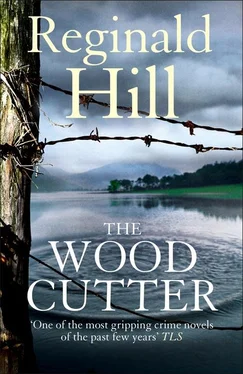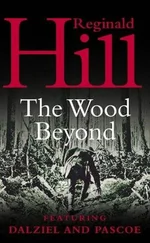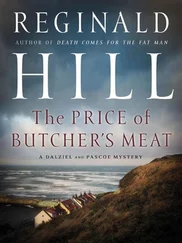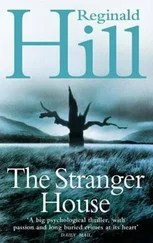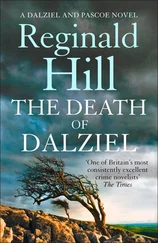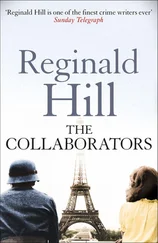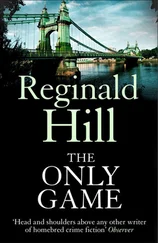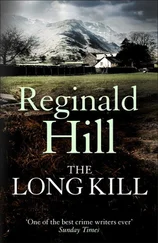The din is getting louder, nearer. The door bursts open. The bald man rushes in with a pistol in his hand. The boy falls to the floor. The man screams something unintelligible and aims the weapon. Before he can fire, Ahmed comes in behind and jumps on his back. The gun goes off. The bullet hits the floor between the boy’s splayed legs.
The two men wrestle briefly. The gun explodes again.
And the bald man slumps against the wall, his hands holding his stomach. Blood seeps through his fingers.
Ahmed stands over him, clutching the pistol. Now at last his eyes meet the boy’s and he tries to smile, but it doesn’t quite work. Then he turns to the door that has been slammed shut in the struggle.
The boy cries, ‘Ahmed, wait!’
But the young Yemeni is already opening the door.
He hardly takes one pace over the threshold before he is driven back into the room by a hail of bullets that shatter his chest.
Their eyes meet once more as he lies on the floor. This time the smile makes it to his lips. Then he dies.
Folded in his father’s arms, the boy finally lets himself cry.
His father says, ‘You did well, you kept your head; the apple doesn’t fall far from the tree, eh? And didn’t I tell you that doing your Latin homework would come in useful some day!’
Two years later his father will be killed when his car is blown up by a FLOSY bomb, so the boy never has the chance to sit down with him as an adult and ask what the subversives wanted him to do as the price of his son’s safety.
Nor what his answer would have been if his own young wits had not been quick enough to reveal the street and the building number where he was being held.
But before he went back to school he did ask how it was that his friend Ahmed, who had loved him enough to save his life and give up his own in the process, could have put him in that perilous position in the first place.
And his father had answered, ‘When love is in opposition to grim necessity, there is usually only one winner.’
He had not understood then what he meant. But he was to understand later.
Autumn 1989;the world in turmoil; the Berlin Wall crumbling; Chris Rea’s The Road to Hell top album; Western civilization watching with bated breath the chain of events that will lead to the freeing of Eastern Europe and the end of the Cold War.
In a Cumbrian forest in a glade dappled by the midday sun, a man sits slumped against a twisted rowan, his weathered face more deeply scored by the thoughts grinding through his bowed head, his eyes fixed upon but not seeing the unopened flask and sandwich box between his feet. A little way apart, a second man stands and watches, his long brown hair edged wolf-grey, his troubled face full of a compassion he knows it is vain to express, while at his back a young girl too regards the sitting man with unblinking gaze, though her expression is much harder to read. And over the wide woodland tract, so rarely free of the wind’s soughing music above, and the pizzicato of cracking twigs below, a silence falls as if trees and sky and surrounding mountains too were bating their breath for fear of intruding on grief.
Three hundred miles to the south in an East London multi-storey car park, five hoodies who probably wouldn’t bate a breath if Jesus Christ crash-landed on St Paul’s in a chariot of fire are breaking into a car.
But they’ve done it once too often, and suddenly cops spring up all around as if someone had been sowing dragon’s teeth. The hoodies scatter and run, only to find there’s no place to run to.
Except for one. He heads for a ten-foot concrete wall with a one-foot gap at the top. To the cops’ amazement, he goes up the wall like a lizard. Then, to their horror, he rolls through the gap and vanishes.
They are on the fifth level and there’s nothing beyond that gap but a sixty-foot drop to the street below.
The cops radio down to ask their waiting colleagues to go round the back of the multi-storey and pick up the corpse.
A few minutes later word comes back – no corpse at the foot of the wall, just a young hoodie who tried to run off as soon as he spotted them.
At the station he tells them he is John Smith, age eighteen, no fixed abode.
After that he shuts up and stays shut up.
They print him. He’s not in the records.
His fellow hoodies claim never to have seen him before. They also claim never to have seen each other before. One of them is so doped up he’s uncertain whether he’s ever seen himself before.
Two are clearly juveniles. A social worker is summoned to sit in on their questioning. The other two have police records. One is eighteen, the other nineteen. The duty solicitor deals with them.
John Smith’s age they’re still not sure about, and something about the youth, some intangible aura of likeability, makes them share their doubts with the duty solicitor.
He starts his interview by pointing out to Smith that as a juvenile he would be dealt with differently, probably getting a light, non-custodial sentence. Smith sticks to his story, refusing to add details about his background though his accent is clearly northern.
The solicitor guesses he’s lying about his age and name to keep his family out of the picture. Hoping to scare the boy into honesty by over-egging the adult consequences of his crime, he turns his attention to the case against him and quickly perceives it isn’t all that strong. Identification via the grainy CCTV tape in the dimly lit multi-storey is a long way this side of reasonable doubt. And could anyone really have shinned down the sheer outer wall in under a minute as the police evidence claims?
As they talk, the boy relaxes as long as no questions are asked about his origins, and the solicitor finds himself warming to his young client. On his way home he diverts to take a photo of the outer wall of the multi-storey to show just how sheer it is. Next day he shows it to the boy, who is clearly touched by this sign of concern, but becomes panicky when told he has to appear before a magistrate that same morning. The solicitor assures him this is just a committal hearing, not a trial, but warns him that as he is officially an adult of no fixed abode, he will almost certainly be remanded in custody.
This is what happens. As the boy is led away, the solicitor tells him not to worry, he will call round at the Remand Centre later in the day. But he has other work to deal with that keeps him busy well into the evening. He remembers the boy as he makes his way home and eases his guilt with the thought that a night in a Remand Centre without sight of a friendly face might be just the thing Smith needs to make him see sense.
He talks to his wife about the boy. She regards him with surprise. He is not in the habit of getting attached to the low-life criminals who form his customary clientele.
He goes to bed early, exhausted. In the small hours when his wife awakens him, whispering she thinks someone is trying to break in through the living-room window, he reckons she must be having a nightmare as their flat is on the tenth floor of a high rise.
But when they go into the living room and switch on the light, there perched on the narrow window box outside the window is the figure of a man.
Not a man. A boy. John Smith.
The solicitor tells his wife it’s OK, opens the window and lets Smith in.
You said you would come , says the boy, half tearfully, half accusingly.
How did you get out of the Centre? asks the solicitor. And how did you find me?
Through a window , says the boy. And your office address was on that card you gave me, so I got in through a skylight and rooted around till I found your home address. I tidied up after, I didn’t leave a mess.
Читать дальше
